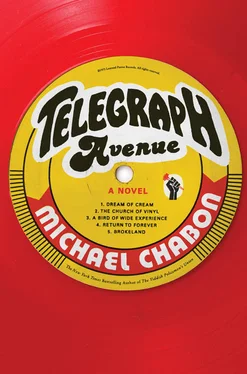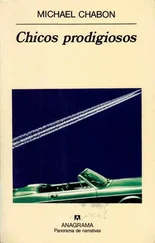It was a pretty day for seizing, that much was certain: the prettiest that Oakland, California, had to offer. The fog had burned off, leaving only a softness, as tender as a memory from childhood, to blur the sunlight that warmed the sprawl of rosemary and purple salvia along the fragrant sidewalk and fell in shifting shafts through the branches of the monkey-puzzle tree. This whimsical evergreen, mammoth and spiky, dominated the front yard of Archy and Gwen’s sagging 1918 bungalow, formerly the home of a mean old Portuguese man named Oliveira. Reputed, when Archy was a kid, to contain an extensive collection of shrunken heads gathered during Mr. Oliveira’s career as a merchant seaman, the house had been a reliable source of neighborhood legend, especially at Halloween, and the mythic memory of those leering heads gave Archy pause sometimes when he came home on an autumn evening, a ring-and-run thrill. He had to this day never forgotten the strange horror of glimpsing one of Mr. Oliveira’s many tattoos, like something out of Nathaniel Hawthorne, consisting of a ragged rectangle, a bar of black ink scrawled across the cordovan hide of the old sailor’s upper arm in order to blot out, like the pen of a censor, some underlying name or image whose memory, for mysterious reasons, was abhorrent.
Archy patted the hip pocket of his jacket, checking for The Meditations , coming down the front steps with his sense of resignation stiffened, in best Stoic fashion, to a kind of resolve. Knowing he had done wrong, prepared to make amends, settle his business. Determined to return to Brokeland, open the doors wide to the angel of retail death, and run the place into the ground all by himself, if that was what it took—but to fail calmly, to fail with style, to fail above all with that true dignity, unknown to his wife or his partner, which lay in never tripping out, never showing offense or hurt to those who had offended or hurt you.
He heard the grumbling of a vintage Detroit engine, inadequately muffled, and watched with dull foreboding as a 1970 Oldsmobile Toronado, recurrent as a bad dream, turned onto Sixty-first Street. The vehicle was in awful shape: formerly green and bleached to a glaucous white, rusted in long streaks and patches so that the side visible resembled a strip of rancid bacon.
Archy was a compulsive admirer of American muscle cars from the ten-year period following his birth in 1968, a period which, in his view—a view often and with countless instances, oral footnotes, and neologisms expounded at the counter of Brokeland Records—corresponded precisely with the most muscular moment in the history of black music in America. His own car, parked in the driveway, was a 1974 El Camino, butterscotch flake, maintained with love and connoisseurship by himself and Sixto “Eddie” Cantor, Stallings Professor of Elcaminology at Motor City Auto Repair and Custom Jobs. Archy was the author of the as yet unwritten Field Guide to Whips of the Funk Era , and thus, even if he had not grown up as the virtual older brother of this particular Toronado, he would have been able, by its GT hood badge and dual exhaust, to identify the model year of the low-fallen specimen rolling up to his house. Of the chrome trim only the white plastic underclips remained, and the hood was held shut by a frayed knot of nylon rope looped through the grille, several vanes of which had fallen out, leaving the unfortunate car with a gap-toothed and goofy Leon Spinks grin. In the backseat he thought he glimpsed the blue plastic Samsonite suitcase his grandmother used to take with her on the Fun Train up to Reno. From the right rear window protruded a deco-style halogen floor lamp of the type that caught Lionel Hampton on fire.
“Nuh-uh,” Archy said, seeing that this was to be one of those days when it was best to remember, following the cue of Marcus Aurelius or possibly Willie Hutch, that the things of the body are as a river, and the things of the soul as a dream and a vapor; and life is a warfare and a pilgrim’s sojourn, and fame after death is only forgetfulness. “Y’all can just continue on your way.”
He could see that it was not Luther at the wheel. Any one of a number of interstellar fuckups and freakazoids might be at the helm of this broke-down starship of the seventies, but Archy’s thoughts leaped with a bitter instinct to Valletta Moore.
Sure enough. A lamentable lamentation of the door hinges, sounding like the gate on a crypt filled with vengeful dead folks being thrown open, and Valletta Moore got out of the car. Big-boned, shapely, on the fatal side of fifty, high-waisted, high-breasted, face a feline triangle. Beer-bottle-brown eyes, skin luminous and butterscotch, as if she herself had come fresh from the spray gun of Sixto Cantor. Ten, eleven years since the last time Archy had seen her, at least.
“Uh-oh. Look out.”
“I know you remember me,” she said.
“I remember you didn’t used to be quite as fine as you are now.”
“‘Look out,’” Valletta quoted back at him, shaking her head, lowering over her amber eyes a pair of bulbous sunglasses with white plastic frames. “I guess I know where you learned that shit.”
Looking at her, already smelling her perfume, Archy’s memory dealt him a rapid hand of images, of which the ace was unquestionably the grand soft spectacle of Valletta Moore, 1978, shaving her legs at his father’s apartment in El Cerrito, glimpsed through the five-inch crack of the open bathroom door. Slender right foot planted on the floor, other foot arched on the shining lip of the bathtub, Valletta bent like a watchmaker over the work of painting a brown razor stripe up the white lathered inside of her long left leg, hair wrapped in a towel but her strong body naked and bold as a flag. The architecture of her ass was something deeper than a memory to Archy, something almost beyond remembrance, an archetype, the pattern of all asses forever after, wired into the structure of reality itself.
“Valletta,” he said, thinking she still looked good, then abandoning all wisdom and ignoring his Spidey sense long enough to let her take him in her arms, the skin of her bare shoulder in a halter top cool against his shoulder, the lady most definitely giving off that heavy 1978 Spencer’s smell of love candles and sandalwood incense but, laid over top of it, the stink of cigarette, the instant-potatoes smell you might find in the interior of a beat-to-shit Toronado. “Damn.”
It was only when she let go of Archy that he saw the tight line of her lips. She looked left, right. She was worried, hiding, running: running to Archy. In the pit of his sensitive belly, neurotransmitters registered with a flutter of dread whatever kind of trouble his father was currently getting himself into. Already thinking it might have something to do with Chandler Flowers, his father’s best friend, back in the day. How Flowers had come into the store today, asking, of all things, Your dad around? Luther reported to have been down in West Hollywood someplace, last Archy heard, not that he ever sought the least news or information of Luther’s who-, what-, where-, when- or whyabouts.
“Well, it sure has been a long time, Valletta,” he said cheerfully, deciding to pretend that he believed she had been driving Luther’s car down Sixty-first Street, happened to see him on his front porch, and decided to stop and say hello. As if she could have stared clean through 175 pounds and thirty years to recognize the teenager in whose dreams she briefly but intensely featured. “I do have to be running, because I got to, you know, get to the store, but, hey—”
“Archy, no, no, wait, hold up—”
“You have a good day, now. All right? No, really. I’m sorry. But you have a positive day.”
Back when he was a boy, there used to be a gentleman named Joseph Charles, man would stand out every day at the corner of Oregon and Grove wearing a pair of dazzling yellow gloves. Waving to every car that passed him, extending to its driver, regardless of race, creed, or receptivity, one (1) genuine, heartfelt greeting. Mr. Charles’s manner bold and cheerful but a touch formal, hinting, though not in any unkind way, at the impersonal. No intention of greeting you in particular; simply reminding you that, like all humans, you partook in the noble human capacity for being greeted. It was Mr. Charles’s manner that Archy tended to adopt around women when he sensed they might be about to pose him some kind of problem. He gave Valletta’s shoulder a fond squeeze, started away. In his heart, he already knew that he was not going to get anywhere; not yet. Like many abandoned sons, he was conscious of owing a mysterious, unrepayable debt toward the man of whom, in truth, he was the eternal creditor.
Читать дальше
Конец ознакомительного отрывка
Купить книгу












